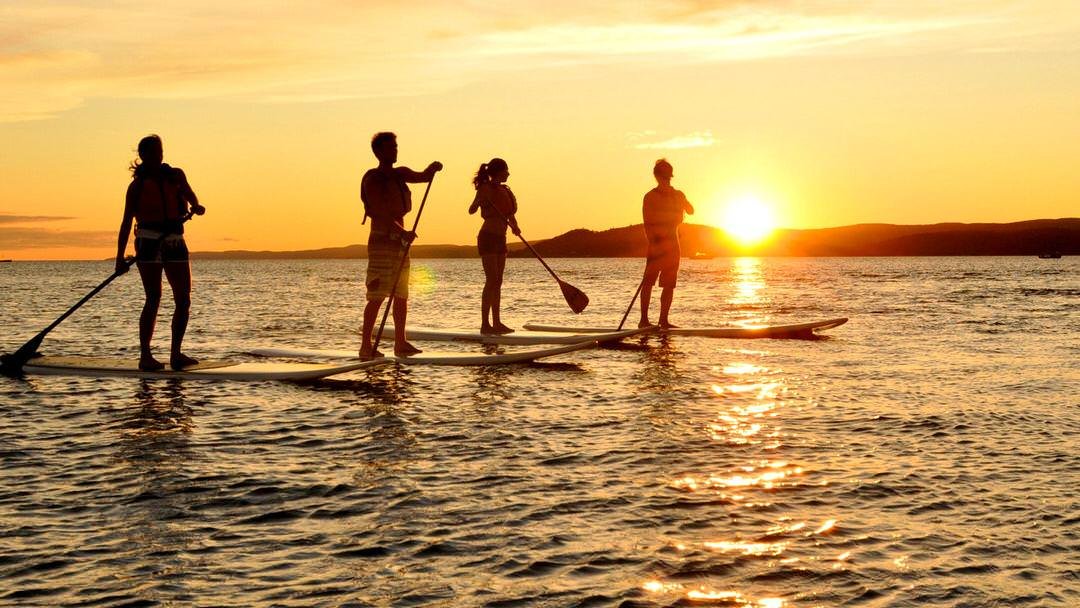Imagine an activity that enables you to experience a combination of adventure and mindfulness.
Imagine it also helps you achieve a deep sense of peace, contentment, and a strong connection to the earth.
Such an activity exists (at least in Peoria, Arizona)! It is called the “Stand Up Paddle Board (SUP): Breath, Body & Wellness Workshop”.
Created by Heidi Brouelette, MA., LPC., the two-hour paddle boarding workshop promises to teach you the basics of paddle boarding while adding a unique twist - guided meditation. Heidi is a licensed professional counselor with a Master's Degree in Counseling Psychology who has a passion for connecting (or reconnecting) busy-minded people with nature for a transformational experience. Heidi believes paddle boarding offers a unique opportunity to connect with nature while developing strength, balance, and a connection with the body through attunement of the five senses. The additional element of guided meditation while afloat is the ultimate anchoring tool to ground ourselves.
Attunement of the 5 Senses
Deepening the attunement with the body and five senses involves becoming more aware of physical sensations, emotions, and thoughts in the present moment. By paying attention to the body and senses, individuals can regulate the nervous system by activating the parasympathetic nervous system, which is responsible for the body's rest and digest response. This can lead to a reduction in stress, anxiety, and other negative emotions, as well as an increase in feelings of relaxation, calmness, and overall well-being.
The SUP experience will enhance your mental focus and clarity while helping you achieve a sense of calmness. Here are a few reasons Stand Up Paddle Board (SUP): Breath, Body & Wellness Workshop is your next must-do experience!
Meditating in Nature Has Health Benefits
Meditating, specifically in nature, has numerous benefits for the mind and body. According to a study by Margaret M. Hansen, Reo Jones, and Kirsten Tocchini in 2017, spending time in nature can reduce stress and anxiety, lower blood pressure, and improve mood. The study found that exposure to nature and green environments had comprehensive health benefits on human systems1. The review of empirical research also suggested that nature therapy as a health-promotion method and potential universal health model is implicated in reducing reported modern-day "stress-state" and "technostress”2.
Since the guided meditation portion of the SUP: Breath, Body & Wellness Workshop takes place exclusively in nature, participants in the workshop will be reaping the benefits from time spent meditating in nature!
Connecting with Nature, And Disconnecting from Technology Helps Us "Rewild" Ourselves
While rewilding is typically associated with restoring landscapes and habitats, there is also a growing movement towards "rewilding ourselves" - reconnecting with nature and our ancestral roots to promote physical and mental health.
There are many potential benefits to rewilding ourselves. Spending time in nature has been found to have many positive effects on mental health, including reducing stress and anxiety, improving mood, and promoting feelings of relaxation and well-being1. While there is still much debate about the best ways to rewild ourselves, there is growing evidence that reconnecting with nature and our ancestral roots can significantly benefit physical and mental health.
Because of the overwhelming evidence and her own personal experiences, Heidi believes wholeheartedly that deepening our connection to nature and our body is the perfect remedy to help feeling soulful and joyous. As a result, she chose an activity with a beautiful backdrop and free from digital distractions as the basis for the Stand Up Paddle Board (SUP): Breath, Body & Wellness Workshop.
Paddle Boarding Is A Tool for Improving Our Psychological Well-Being
Paddleboarding has been found to have several psychological benefits, including reducing stress and anxiety, improving mood, and promoting mindfulness and relaxation. Specifically, Schram, Hing, and Climstein (2016) studied the effects of stand-up paddle boarding (SUP) on physiological, musculoskeletal, and psychological outcomes. Participants reported experiencing increased feelings of relaxation and reduced stress levels after participating in SUP. Moreover, the study found that SUP can improve mood and self-esteem and may even have therapeutic benefits for individuals with anxiety and depression4.
The study suggests that SUP can positively affect physical and psychological health. SUP may be valuable for individuals looking to improve their overall health and well-being4. This is precisely why Heidi included stand-up paddleboarding in the Stand Up Paddle Board (SUP): Breath, Body & Wellness Workshop. The activity can be an inward healing journey by itself, even though the addition of guided meditation enhances the self-discovery process.
Stand Up, Paddle, And Improve Your Well-Being
The Stand Up Paddle Board (SUP): Breath, Body & Wellness Workshop in Peoria, Arizona, offers a unique opportunity to combine adventure and mindfulness while attaining a profound sense of peace, contentment, and connection to the earth and body. By learning the basics of paddle boarding and participating in a guided meditation in a natural setting, participants can experience the numerous health benefits of spending time in nature. Research has shown that exposure to nature can reduce stress and anxiety levels, lower blood pressure, and improve mood. Also, the workshop provides an opportunity for participants to "rewild" themselves - reconnecting with nature and unplugging technology to find inner peace and calmness. The SUP workshop provides a practical and enjoyable way to engage in this process and improve overall well-being. Register today!

